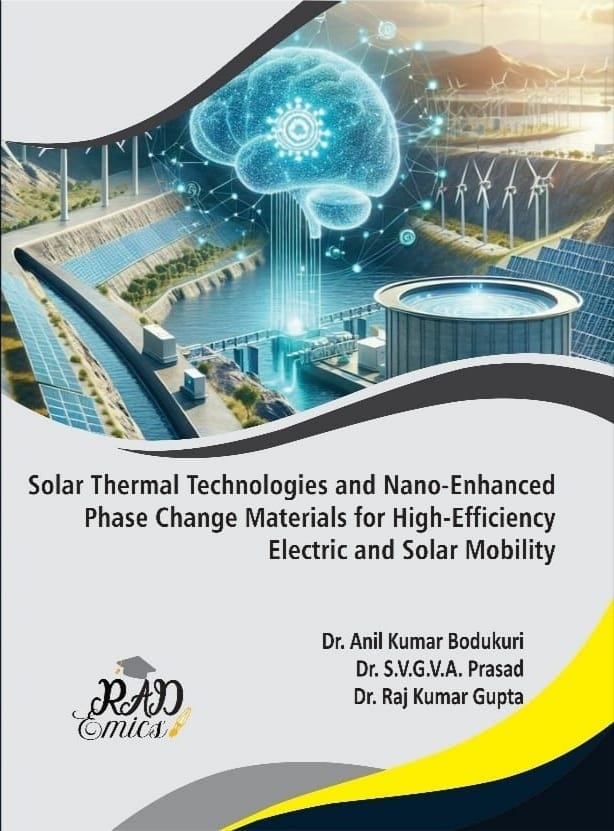
Peer Reviewed Chapter
Chapter Name : Solar-Powered Hydrogen Fuel Cells and the Role of PCM in Hydrogen Storage for Sustainable Transportation
Author Name : Ch. Venkateswara Rao, Somarouthu V G V A Prasad
Copyright: @2025 | Pages: 38
DOI: 10.71443/9789349552654-12
Received: WU Accepted: WU Published: WU
Abstract
The integration of solar-powered hydrogen fuel cells with advanced phase change materials (PCMs) represents a promising frontier in the pursuit of sustainable transportation solutions. This chapter explores the critical intersection of renewable energy conversion, efficient hydrogen storage, and intelligent system management to address key challenges in clean mobility. Emphasis is placed on the role of PCMs in enhancing thermal regulation and safety during hydrogen storage, while algorithmic intelligence—including machine learning and real-time monitoring—enables optimized hydrogen production and system reliability. By the chapter underscores the significance of social pedagogy frameworks to foster public awareness, trust, and participatory engagement essential for widespread adoption. By bridging cutting-edge technological advancements with data-driven decision-making and inclusive social strategies, this work presents a comprehensive roadmap for accelerating the transition to low-carbon transport infrastructures. The insights offered aim to guide future research, policy development, and industrial applications, ensuring that hydrogen technologies fulfill their potential as scalable, safe, and socially accepted solutions within the global energy landscape.
Introduction
The growing urgency to mitigate climate change and reduce dependence on fossil fuels has propelled the search for clean and sustainable energy alternatives, with hydrogen emerging as a promising energy carrier [1]. Solar-powered hydrogen fuel cells offer a compelling pathway by coupling renewable solar energy with hydrogen production, storage, and utilization in transportation systems [2]. This approach not only leverages the abundance of solar radiation but also enables the conversion of intermittent renewable energy into a storable and transportable fuel [3]. The advantages of hydrogen fuel cells, including zero direct emissions and high energy density, position them as key enablers for decarbonizing the transportation sector [4]. Thefull potential of solar-driven hydrogen technologies remain contingent upon overcoming several technical and social barriers, particularly in efficient hydrogen storage and system integration [5].
A critical challenge in hydrogen-based transportation systems is the safe and efficient storage of hydrogen, which has historically been limited by the low volumetric energy density and the highly flammable nature of the gas [6]. Phase change materials (PCMs) have garnered significant attention as thermal management agents to enhance the safety and performance of hydrogen storage tanks [7]. By absorbing and releasing latent heat during phase transitions, PCMs regulate temperature fluctuations that can compromise storage integrity and reduce system efficiency [8]. Integrating PCMs with hydrogen storage not only stabilizes thermal conditions but also extends the operational lifespan of storage units by preventing material degradation caused by thermal cycling. Despite these advantages [9], the design and optimization of PCM-based storage systems require advanced modeling and control strategies to tailor phase transition behavior for specific hydrogen storage conditions [10].